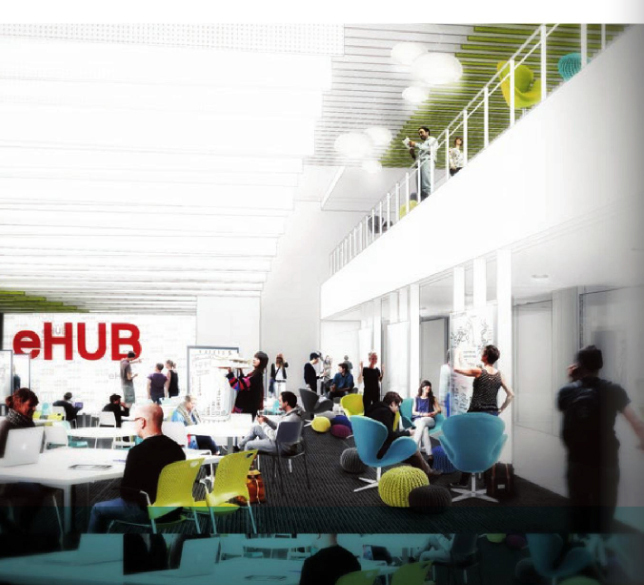eHub grows space for student entrepreneurs
By Kathy Hovis

Cornell students need community entrepreneurship space that provides an effective environment to hatch ideas, work together, discuss problems, get mentorship and run actual businesses.
In partnership with the Student Agencies Foundation, Cornell is addressing this need by creating eHub. eHub, slated to open in spring 2016, will be housed in two newly renovated facilities designed to foster entrepreneurism among Cornell students, faculty and staff.
eHub will include 10,000 square feet on the second and third floors of the Student Agencies building at 409 College Ave. and 4,000 square feet on the first floor of Kennedy Hall on campus. eHub will cement Cornell’s position as a leader in entrepreneurship and innovation. This month Forbes magazine named Cornell the No. 4 most entrepreneurial research university producing students with startup talent.
The eHub project is a partnership among Entrepreneurship at Cornell, the Student Agencies Foundation, the Samuel Curtis Johnson Graduate School of Management, the College of Agriculture and Life Sciences, the College of Engineering, the ILR School and the School of Hotel Administration.
“Building eHub is currently the most important project for Entrepreneurship at Cornell,” said Zach Shulman ’87, J.D. ’90, director of Entrepreneurship at Cornell. “eHub will continue to elevate Cornell’s entrepreneurship branding and programmatic offerings and serve students across our entire campus. Students have made their needs very clear, and we are delighted to address them head on.”
“The Student Agencies Foundation’s mission is dedicated to helping promote entrepreneurship, student economic self-help and business learning at Cornell. We are very pleased to be partnering with Cornell to build and advance this incredible project,” said Michael Karangelen ’90, chairman and president of Student Agencies Foundation.
The eHub space in Collegetown will house several existing organizations: eLab (a business accelerator program offering mentorship to student companies and their management teams), Student Agencies Inc. and PopShop (a community of entrepreneurially minded students). The space ultimately will host other organizations that support Cornell entrepreneurship and experiential business learning and offer programs including mentors-in-residence, workshops, seminars and hack-a-thons, among other events.
Sam Langer ’17, a psychology major in the College of Arts and Sciences, says eHub will allow for student collaborations that currently are not taking place.
“At Cornell, people meet each other through classes, clubs or fraternities, but this will provide a space to meet around a very different interest and a common theme of creativity,” he said. Langer worked with PopShop directors last year to set up a successful series of meetings between creative students on campus – musicians, filmmakers, fashion designers and others – in the PopShop space.
The Kennedy Hall space will include offices for Entrepreneurship at Cornell, spaces for group meetings, conferences, events, classes, presentations and open areas for discussions and planning. Both spaces will be open to all students across the Cornell campus.
The $4.5 million eHub project is possible only with the help of alumni, Shulman said, who have contributed most of the funds for the project.
Media Contact
Get Cornell news delivered right to your inbox.
Subscribe